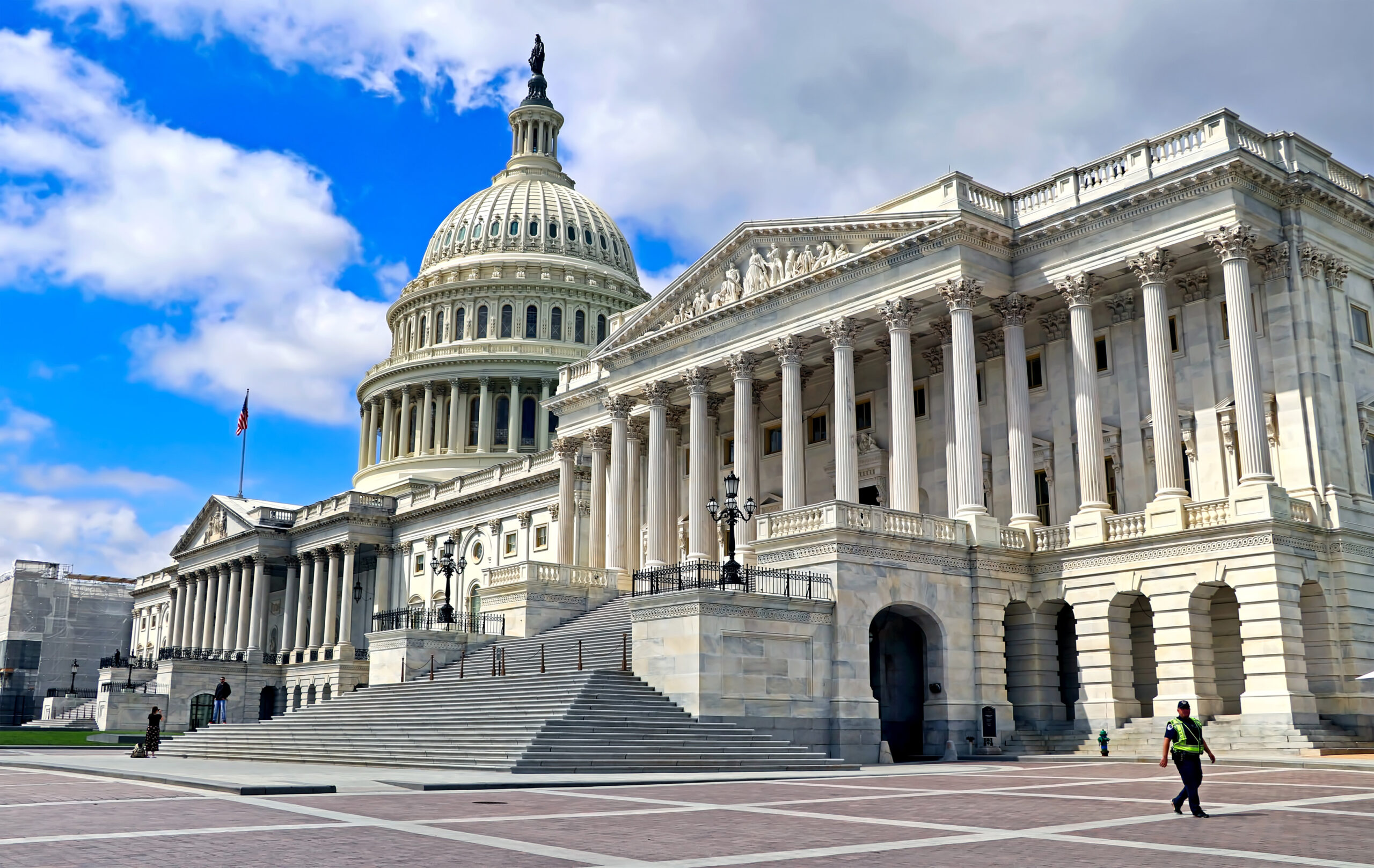U.S. Senate probe accuses oil industry of “denial, disinformation, and doublespeak”
A Senate committee published the latest instalment of a multi-year investigation after obtaining a vast trove of internal documents from oil industry giants ExxonMobil, Chevron, BP, and Shell. The report alleges the efforts to slow climate action continue to this day.

A U.S. Senate panel published an investigation into the recent history of oil industry disinformation, offering more evidence that the oil majors continue to intentionally slow global efforts on climate change.
The Senate Budget Committee report, published on April 30th, builds on a previous investigation launched by the House Oversight Committee in 2021, which documented an ongoing campaign of deception from the oil industry. The latest hearing unveiled new details, drawn from millions of documents obtained by the committee, about the current and recent efforts by a handful of oil majors and their affiliated trade associations to foil progress on climate change.
The chairman of the Budget Committee, Rhode Island Senator Sheldon Whitehouse, said the latest phase of industry obfuscation eschews overt climate denial from previous decades and instead involves a public-facing campaign of positioning the oil industry as partners in climate solutions, but with the intention of delaying the energy transition.
It includes “nominally expressing alignment with the Paris Agreement climate goals, while internally making them unachievable,” Senator Whitehouse said at the May 1 hearing, detailing the findings of the investigation. It also includes “stating emissions reduction targets too far out to matter, and internally not taking the steps necessary to meet them.” He called this strategy “Climate Denial Lite.”
Reporting and research over the past decade have shown that the top oil companies knew about climate change for decades. As far back as 1959, a physicist warned the American Petroleum Institute that the burning of fossil fuels warmed the planet. In the 1960s and 1970s, ExxonMobil conducted climate research and knew about climate change.
Between 1977 and 2003, ExxonMobil’s own scientists modelled and predicted climate change with “shocking skill and accuracy,” as Geoffrey Supran, an associate professor at the University of Miami and an expert in climate disinformation, described it at the Senate hearing.
Instead of informing the public, ExxonMobil and others “weaponised science against itself,” Supran said, by emphasising uncertainty, sowing doubt, and denying the existence of climate change through a network of think tanks, PR firms, and trade associations over the course of the 1980s and 1990s.
While much of that is by now well-known, the approach of “putting spin before the science, continues to this day,” Supran said. Today, instead of overt climate denial, the oil majors engage in “delay,” by advertising their preferred solutions and attempting to shift the burden of responsibility onto individuals. Meanwhile they lobby extensively to block climate policies.
For instance, one 2019 email reveals that BP officials were publicly professing alignment with net zero targets but were internally noncommittal because such targets would jeopardize their investments. A BP official wrote: “it goes a bit too far to state or imply support for net zero by 2050, because that would require policy likely to put some existing assets at risk, and we haven’t discussed that internally.” Nevertheless, the official wrote that it was important to publicly “stand by our public support for the Paris goals and the achievement of net zero ‘in the coming decades.’”
The oil majors heavily advertise their preferred climate solutions, such as biofuels, carbon capture and sequestration, and blue hydrogen. But it’s not even clear that the companies themselves are confident about the viability of these technologies.
For instance, ExxonMobil featured its algae-based biofuels programme prominently in its advertisements over the past decade, spending $175 million on algae ads between 2009 and 2023. However, Exxon only spent $350 million on actually researching algae fuels, suggesting that the company did not take the programme especially seriously.
That is echoed in clean energy investments more broadly. In 2023, only 11 percent of Shell’s capital expenditures went into low carbon solutions, with the vast majority of spending on its conventional fossil fuel business. Even that figure was higher than its American peers — only 6 percent of ExxonMobil’s capex went to low carbon investments, and Chevron’s share was only 4 percent.
“The internal industry documents released to the public and the testimony at this hearing add to the already considerable mountain of evidence illustrating misconduct by fossil fuel corporations and their surrogates,” Kathy Mulvey, accountability campaign director at the Union of Concerned Scientists, a Washington-based NGO, said in a statement. “We urge policymakers and public prosecutors to move expeditiously to pursue accountability through every means at their disposal.”
Gas as a solution
In recent years, oil majors have also gone to great lengths to position natural gas as a key plank of the energy transition, and they continue to refer to gas as “clean,” even though methane is a powerful greenhouse gas.
An internal BP draft presentation from 2018 shows that the company’s strategy to promote gas was to “harness excitement” around renewables — to frame gas as the perfect partner to growing clean energy. The document recommended funding research that positioned gas as “a friend to renewables.”
A 2017 email from BP stated that “promoting and protecting the role of gas as an increasing part of our energy mix is a paramount priority. We need to be ready to speak to this wherever there is a credible effort to dis-incentivize gas.”
Research has piled up in recent years about the vast amount of methane leaking and being intentionally vented from oil and gas operations, which undermines the notion that gas offers any climate benefit over coal. Publicly, oil and gas companies and their trade groups assert that gas and LNG are climate solutions.
But internally, industry officials appear to have grown concerned about the increasing scrutiny over methane leaks, which could undermine the case for gas. A 2019 email from a BP lobbyist said: “This is an issue that will not go away.” Another wrote: “It is quite concerning to us as another blow against natural gas.”
In response to questions from Gas Outlook about the Senate hearing and investigation, Elise Otten, a spokesperson for ExxonMobil, said: “These are tired allegations that have already been publicly addressed through previous Congressional hearings on the same topic and litigation in the courts. As we have said time and time again, climate change is real, and we have an entire business dedicated to reducing emissions – both our own and others. In fact, our annualized spend is 1/3 of the EPA’s total budget.”
BP, Shell, and Chevron did not respond to inquiries from Gas Outlook.
Climate litigation
The Senate hearing also heard testimony from Sharon Eubanks, the lead counsel for the U.S. government in litigation against the tobacco industry in 2004-2005. That case led to a landmark 2006 ruling that found the tobacco industry conspired to deceive American people about the health hazards of smoking.
Eubanks said that the factual findings of that case “reveal striking similarities with the behavior of the petroleum industry.”
Specifically, both industries engaged in a decades-long public relations campaign to mislead the public, concealed scientific evidence, and funded dubious and even false science to undercut the public perception about their products, among other tactics, she said. Tobacco companies were found liable by the court, which forced the industry to overhaul its practices and pay enormous sums in financial settlements.
At this point, the vast body of evidence about the oil and gas industry’s efforts to mislead the public is so extensive that it has sparked more than 1,800 lawsuits against the oil industry worldwide.
But Eubanks said that the U.S. government should also take action.
“We should not waste any more time wringing our hands about what can be done. There exists solid evidentiary basis to move forward with a request to the Department of Justice to investigate the actions of the fossil fuel industry,” she told the Senate committee.
“Just as the Department of Justice investigated the tobacco industry and ultimately filed a civil racketeering complaint against the industry, given the similarities of the fraudulent acts, and the government’s successful case against tobacco, there is adequate foundation for building a case.”


